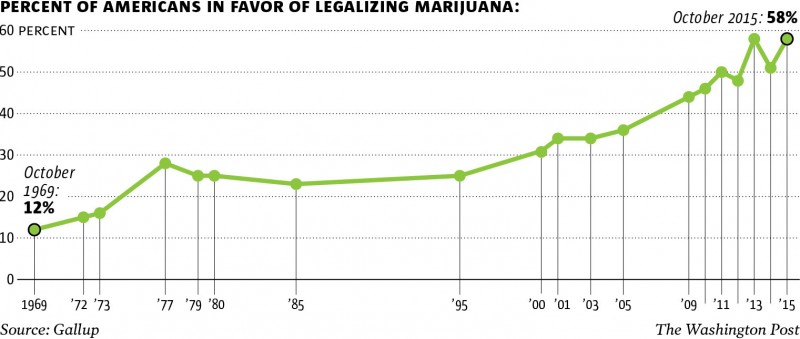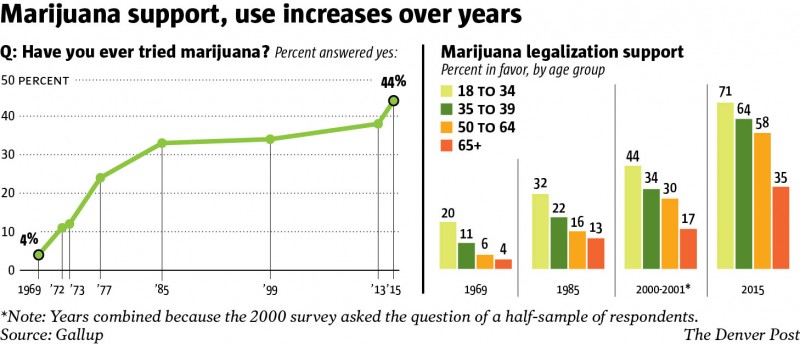A record number of Americans think marijuana use should be legal, according to a new poll released Wednesday by international pollster Gallup.
And government surveys published Wednesday offered further indications that marijuana is moving into the mainstream nationally, nearly three years after Colorado voters legalized recreational pot.
Marijuana use among U.S. adults doubled over the past decade, rising to more than 22 million mostly recreational users, the surveys show.
The results come from a comparison of health surveys from 2001-02 and 2012-13 sponsored by the National Institute on Alcohol Abuse and Alcoholism. Almost 80,000 adults aged 18 and older participated in face-to-face interviews about various health-related behaviors, according to results published in the journal JAMA Psychiatry.
In 2015, 58 percent of Americans say cannabis use should be legal in the U.S. — tying the highest acceptance numbers ( from 2013) in the Gallup’s 46 years of asking Americans about marijuana. In 2014, the year between those record high pot polling percentages, 51 percent of Americans supported legalization.
The automated telephone Gallup poll was conducted Oct. 7-11 with a margin of error of 4 percentage points.
Pot polls don’t lie
From Fox News: Read this Fox News poll if you still doubt U.S.’s desire for pot
From Pew: 53% of Americans want legal pot; Most want feds to butt out
From Bloomberg: Retail pot will be legal nationwide in 20 years, say 58% of U.S. adults in poll
From Quinnipiac University: Colorado still shows strong support for marijuana legalization
NEW: Get podcasts of The Cannabist Show.
Subscribe to our newsletter here.
Watch The Cannabist Show.
And Gallup predicts Americans’ support for legalization will only increase in the years to come.
“Given the patterns of support by age, that percentage should continue to grow in the future,” Jeffrey M. Jones wrote for Gallup. “Younger generations of Americans have been increasingly likely to favor legal use of marijuana as they entered adulthood compared with older generations of Americans when they were the same age decades ago. Now, more than seven in 10 of today’s young adults support legalization.”
Legalization proponents were quick to celebrate the news.
“The latest poll results point to the absurdity and even venality of persisting with harsh prohibitionist policies,” Ethan Nadelmann, founder and executive director of the Drug Policy Alliance, said in a statement. “No other law is enforced so harshly and pervasively yet deemed unnecessary by so many Americans. Spending billions of dollars and arresting 700,000 people annually for violating marijuana laws now represents not just foolish public policy but also an inappropriate and indecent use of police powers.”
Added Mason Tvert, director of communications at the Marijuana Policy Project and one of the primary forces behind Colorado’s pot-legalizing Amendment 64 in 2012: “It’s pretty clear which direction our nation is heading on this issue. The status quo has shifted. Marijuana prohibition has been a public policy disaster, and most Americans are ready to put it behind us and move on.”
Marijuana Majority chairman Tom Angell said political leaders should pay attention to the shifting attitudes toward marijuana.
“The constant stream of surveys showing public support for ending prohibition is why we’re seeing an increasing number of national politicians saying that it’s time to at least let states implement their own laws without federal interference,” Angell said.
Nadelmann agreed.
“More elected officials need to realize that legalizing marijuana is not just the right thing to do — it’s the politically smart thing to do, too,” he said.
Most recently this shift in political opinion was seen in the U.S.’s neighbor to the north, Canada, where the Liberal party on Monday swept national elections on a platform of change that included legalizing and regulating the sale of cannabis, as touted by Prime Minister-elect Justin Trudeau.
Marijuana stats
Legal marijuana sales: Get monthly updates on Colorado cannabis sales
What percentage of Colorado uses marijuana? State survey results are in
As with previous polls, younger Americans and Democrats/Independents were more likely to favor legalization than older voters and Republicans in Gallup’s 2015 poll. That said, three of the four age groups Gallup delineates strongly supported legalization in the 2015 poll — including those 18-34 years old (71 percent), those 35-49 (64 percent) and those 50-64 (58 percent).
Only 35 percent of the 65-and-older group supported marijuana legalization.
“The effects of 80-plus years of anti-marijuana propaganda are slowly wearing off,” Tvert said. “Once people realize that marijuana is actually safer than alcohol, they tend to agree that adults should not be punished just for consuming it.”
The Associated Press contributed to this report.
Ricardo Baca: 303-954-1394, rbaca@denverpost.com or @bruvs


